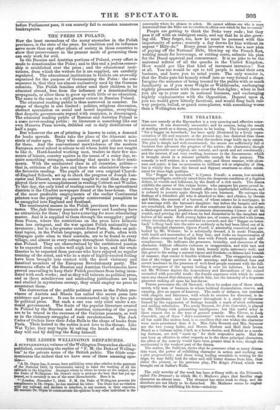THE THEATRES.
THE new comedy at the Haymarket is a very amusing and effective enter- tainment. It was deservedly successful; and its success, being the result of sterling merit as a drama, promises to be lasting. The homely proverb, " Set a beggar on horseback," has been aptly illustrated by a lively repre- sentation of life and manners at the present day, less distorted than those commonly reflected in the mirror that the modern stage holds up to nature, The plot is simple and well-constricted; the scenes are sufficiently full of business that advances the progress of the action; the characters, though neither agreeable nor original, are natural, and speak and act consistently; and the interest, if not very exciting, increases to the denouement; which is brought about in a manner probable enough for the purpose. The comedy is well written, in a sensible, easy, and direct manner, with close- ness and point: it has no pretension to brilliant wit or originality of ides, but is wholly free from the forced and flippant smartness so often substi- tuted for those high qualities.
The " Beggar on horseback" is Cymon Fossil; a coarse, low-minded, cunning profligate, suddenly raised from the desperate condition of a fugitive debtor, to wealth and influence, by the death of a rich uncle. The drama exhibits the career of this vulgar brute; who pampers his purse-proud in- solence by all the means that wealth offers to unprincipled selfishness, and is reduced to poverty again through his own baseness. He outrages the feelings of a friendless girl who is attached to him; and obtains, by threats geld bribes, the consent of a baronet, of whose estates he is mortgagee, to his marriage with the baronet's daughter: but before the bargain and sale are concluded, the buyer loses all that constitutes his claim on the seller; a discharged steward produces documents dispossessing Cymon of all his wealth, and proving the girl whom he had discarded to be the daughter and heiress of his uncle. Both young ladies are, of course, provided with lovers, whose devotion they are now enabled to reward; and the " Beggar on horse- back" is flung back into the mire as suddenly as he had been lifted out of it.
The principal character, Cymon Fozall, is admirably conceived and em- bodied by Mr. Webster: he is artistically dressed, a la mode Fran**, with beard and moustaches of a foxy hue; and looks an impersonation of that odious compound an English boor with French assumption and self- complacency. He indicates the grossness, brutality, and meanness of the character, without offensive rudeness or exaggeration, and with tact and pleasantry. The part suits his hard, homely style, extremely well; and this gives to his acting a natural vigour and freedom—a fulness and breadth of manner, that render it forcible without effort. The swaggering exalta- tion of the vulgar parvenu is made amusing; and his subdued tone and covert insolence in the presence of well-bred people contrast with the full- blown arrogance of the upstart lording it over his inferiors. In the last act Mr. Webster depicts the despondency and discomfiture of the ruined scoundrel with powerful truth: the frantic eagerness with which he seizes upon any chance that chicanery affords him, has the intensity of a desperate gamester staking all upon his last throw.
Farren personates the old Steward; whom he makes one of those sleek, secret, wily men of business, to whom habitual dissimulation, reserve, and cunning, give an aspect of knavery. The smile of defiance, not unmixed with chagrin and bitterness, with which he receives his dismissal, is in- tensely significant; and his manner throughout is a study of character formed by the suppression of feelings beneath a mask of meek sufferance and smiling submission. The needy Baronet, Sir John Coverdale, is played by Mr. Tilbury with painstaking intelligence; but this useful actor in farce cannot rise to the tone of genteel comedy. Mrs. Glover, as Lady Coverdale, one of those " Job's comforters" whose words flow smooth as oil but scald like molten lead, is so excellent that one wishes the character were more prominent than it is. Miss Julia Bennett and Mrs. Seymour are the two young ladies, and Messrs. Hudson and Holl their lovers. Bland as a German tailor, Clark as a horse-dealer, and Brindal as a sneak- ing footman, are well " made up " for their respective parts. Had the cast been as effective in other respects as in the three principal characters, the effect of the comedy would have been greater than it was; though the sentimental is the weakest part of the drama.
The author, Mr. Sullivan, shows that he possesses what so many drama- tists want, the power of exhibiting character in action and working out a plot progressively; and these being leading essentials in writing for the stage, we may fairly look for other and still better dramas from him, than either the present, or his previous play, The King's Friend, which was brought out at Sadler's Wells.


























 Previous page
Previous page